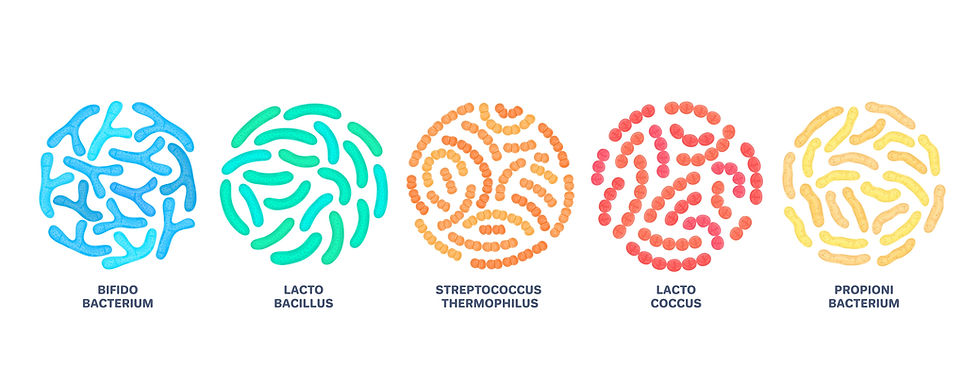"Research Roundup" August 2023 Edition
- Jennifer Philips
- Aug 31, 2023
- 4 min read

‘Clearer than ever’ connection between the gut-brain axis and autism
Incorporating data from multiple datasets on the composition of the gut microbiome in autism spectrum disorder (ASD) has revealed the strongest evidence yet for involvement of the gut-brain axis in relation to ASD. Multiple researchers from various different institutions trawled the acquired information that not only looked at specific bacterial species but also “dietary patterns, metabolomics, cytokine profiles and human brain gene expression profiles” in relation to ASD. They concluded a fairly consistent profile of bacteria related to ASD including “microbial species in the genera Prevotella, Bifidobacterium, Desulfovibrio and Bacteroides.” Further, they noted evidence of potential ‘cross-talk’ between gut bacteria and brain metabolism, adding to the already well-discussed idea of a gut-brain axis relevant to ASD. Finally, FMT - fecal matter transplant - also got some further support in terms of the relationship between changing the gut microbiota and signs of behavioral changes as measured by instruments such as the Childhood Autism Rating Scale (CARS). Cumulatively, such findings add and build upon years of research and discussion about the relevance of the gut-brain axis to ASD. Importantly too, they encourage further study into how therapeutics targeting the gut may have real-world positive effects on behavioural presentation in ASD.
[Note From J. Rodakis: This is an important milestone. While many studies have shown links between the microbiome and ASD, a common “signal” across studies has been elusive, providing ammo for the naysayers. This study took a new quantitative approach and found a common signal. Especially notable that this study was led by Simons Foundation and includes a "who’s who" in ASD microbiome research. This is a major inflection point for ASD research.
Here is a particularly good article about what it all means ]
Epilepsy with aggression more common in regressive autism?
The combined presence of epilepsy with aggression are seemingly more common in cases of ASD accompanied by regression (loss of previously acquired skills) than ASD without regression according to new US research. A retrospective review of the clinical records of nearly 120 people, older than 12 years old, revealed the combinatorial significant association, not seen when looking at aggression and epilepsy individually. Researchers also discussed a specific pattern of symptoms starting with early onset regression, development of epilepsy “at elementary school age” and finally, aggression in later childhood with further study indicated. In light of the addition of ‘loss of previously acquired skills’ to the ICD-11 description of autism (ICD being one of the primary diagnostic manuals), the time is ripe for further inquiry into both the behavioural and biological processes behind regressive autism.
Full-text: https://www.mdpi.com/2075-4426/13/7/1049
[Note from J. Rodakis: Good to see “regression” increasingly recognized as a valid factor. When we started, N of One, regression was often dismissed as stemming from parents who "just missed the signs."]

Autism a risk factor for dropping out of school
Important discussions on the seeming over-representation of school refusal among those with ASD may actually be hiding an even more serious issue: dropping out of school early. That between 15-20% of young people with ASD dropped out of school before starting higher education, according to new data from 1987 and 1997 birth cohorts in Finland, should be of real concern to many. That also ASD was the diagnosis with the highest proportion of early school dropouts among a range of diagnoses, including conduct disorder and learning disability, is equally worrying. The study authors stress how more research is needed into why they got the results they did and importantly, how interventions might tackle such inequality, which can potentially have lifelong implications.
Covid lockdown in England most adversely affected those with autism
The Covid-19 pandemic had profound effects globally. Aside from the immense loss of life caused by the virus, the societal repercussions of the pandemic still loom large today. The lockdowns used during the pandemic also played a role in societal effects of the pandemic. New research from the United Kingdom (UK) suggests that the effects of lockdown were not evenly spread among British society and that those young people diagnosed with ASD and/or ADHD might have been particularly adversely affected by it. Analyzing data from over 1700 responses to a survey, researchers described how those with autism/ADHD had more behavioral difficulties and greater emotional and behavioral deterioration during lockdown than controls diagnosed with emotional disorders (depression, anxiety, obsessive compulsive disorder). Challenges with education were an important variable allied to the primary findings. Whether such findings will have any longer-term effects is not yet known given the unique situations that arose from the pandemic. Further studies on other geographic populations are also indicated to ascertain the generalizability of the findings.

And finally: Saying goodbye to Donald Triplett, autism’s first child
Rest in peace Donald Triplett. ‘Case 1’ in the seminal 1943 paper from Leo Kanner, the clinician credited with publishing the first formal description of what we now call autism. The documentary ‘In a Different Key’ tracked Donald down and showed us the human side of Donald outside of the very clinical description of his early years provided by Kanner. We saw a man living a good life, alongside the real warmth (and protection) of the community around him.
Media: https://www.theatlantic.com/ideas/archive/2023/06/autism-first-diagnosis-donald-triplett/674453/
Full-text: (credit to the Simons Foundation)




Comments